

| Last updated: 24 July 2003 | ||||
 AbaloneColumbia GamesAbalone is perhaps best compared to sumo wrestling: The basic premise is that each player starts with 15 of marbles on a board of hexagons. The idea is to push six of your opponent's marbles off the board, which you do by having more of your marbles in a row than he does. This leads to a basic strategy of keeping your marbles together in a flexible "wedge" formation, and trying to avoid "flanking"-style attacks. Conversely, you want to split up your opponent's forces as much as possible. Abalone comes with marbles for two players, but can be played with up to six with expansion sets. It works best with two or three players. I think this is a good game.
 AcquireAvalon Hill GamesAcquire is an older game based on building hotel chains. Players draw seven Scrabble-style tiles with a grid location on each from a bag. Each turn consists of playing a tile at its grid location and drawing a new one. When a player places two tiles next to each other, he creates a hotel chain, and gets a free piece of stock in that hotel. Then, players can buy stock in existing hotels. The strategy comes in with mergers: When a tile is placed that unites two hotels, the smaller hotel is swallowed by the larger, and players get bonus money if they were the largest or second-largest shareholder in the swallowed hotel. Players also have the option of selling their stock in that hotel, or trading it in two-for-one for the larger hotel. But it may be worth keeping, since the defunct hotel can be re-created later on. It's a solid, simple game. I think this is a good game. The current release returns to the high-quality production values of the original version.
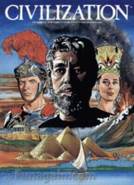 CivilizationAvalon Hill GamesThis is one of the classic Avalon Hill games whose popularity I just don't get. In Civilization, each player plays an ancient civilization trying to climb the technological and cultural ladder to become the first to reach a certain goal of advancement. Civilization is highly-regarded as one of the earlier games to discourage combat among players (in fact, more than one Civ aficionado I know has said outright that combative players never win). I don't have any problem with this in and of itself, but Civ always strikes me as too programmed and limited: There are almost always several players who are very close to each other, and winning is often a photo-finish. There doesn't seem to be much strategy in advancing your civilization. Moreover, the rules of the game impose an inherent limit on how large your empire can grow, which is always disappointing. The fun part in the game is in acquiring and trading commodities, which are received according to the number of cities you have in play. You try to get several of the same commodities so you can trade them in for civilization cards, which advance your nation. (This plays much better with the Advanced Civilization expansion, which adds new wrinkles to the commodities trading.) I think this is a poor game. If you want to build cities and fight people, Diplomacy is a far superior game. If you want to trade commodities and build things, then The Settlers of Catan and Res Publica are both more fun and much shorter.
 DiplomacyAvalon Hill GamesDiplomacy is Avalon Hill's classic game of conquest. Played on a map of pre-World War I Europe, each player manages one of the seven major nations of the day (England, France, Italy, Russia, Austria-Hungary, Germany and Turkey). The goal is to capture 18 of the 36 supply centers on the map. The trick is that no single nation has overwhelming force, and it's very difficult to get such force gathered under one flag. So, as the name implies, one must bargain with other players to support you in your cause, which often leads to "I'll scratch your back if you'll scratch mine" deals. What it also leads to is back-stabbing. The rules of Diplomacy are very simple, involving simple moves of fleets and armies, and supporting rules to take over territory. The game is hugely popular, having spawned several variants (Avalon Hill finally released an official variant for Southeast Asia entitled Colonial Diplomacy), and even an e-mail implementation over the Internet. I think this is a great game.
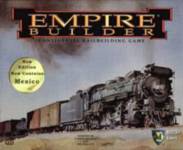 Empire BuilderMayfair GamesMayfair released Empire Builder in the early 1980s, and it's proved extremely popular. It's a railroading game, where each player builds a railroad empire across the United States and southern Canada, and acquires money by ferrying good from one city to another on their rails. The rules are simple, and have the advantage that once you've built your rails, only an act of god (i.e., event cards in the deck of shipping destinations) can destroy them; other players can't be too cutthroat, which makes this a good low-stress game. There are many variants of this basic game. The main variant is Eurorails, taking place in Europe. There's also British Rails, Australian Rails, Nippon Rails (Japan), North American Rails (which adds Mexico to the basic Empire Builder map, and I think is the same as the current version of EB), India Rails, and Lunar Rails. Unfortunately, some of these variants are going out-of-print, as they're all worth playing. There are rumors that we'll eventually African Rails, too. I think these are great games. (There's also a variant called Iron Dragon which has an imaginary map in a fantasy world, which I don't think is quite as good as the others. Worth a look, though; you might disagree.)
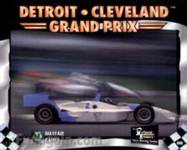 Grand PrixMayfair GamesRacing games seem to have some basic popularity which is enough to keep them in print, but not enough to make them break out. This game involves players bidding to own certain cars in a 6-car race, and then playing a set of cars to move them forward. The trick is that the cards they play don't just move their car(s) forward, but their opponents' cars, too, so they want to play their cars in such a way that their cars move faster. This is facilitated by the fact that cars can get blocked at the narrow turns in the track, thus causing moves to be wasted. It's quite challenging. Players get money based on what position their car finishes in, and therefore wants to bid less than they receive. It needs some work in game balance, though; it's all-too-easy to bid for multiple cars (especially in, say, a five-person game) and to get into ridiculous bidding wars that leave some players at profound disadvantages. A few minor rules modifications about being able to own more cars than another player would help this, though. I think this is an okay game.
Hong Kong Spree!Cheapass GamesA fast-paced game in which players are trying to pick up (i.e., steal) good from a shopping mall and return them to the safety of their car to get points. The catch is that players are going after certain items, and can steal items from other players. And they can shoot other players to disable them and to gain an extra turn. The game comes with rules and a board. Players must supply pawns (two per player), dice, and two decks of cards. A player's hand dictates which cards he's trying to get, and having reached the spot on the board where that card can be found, he plays the card in front of him. Then a player can try to steal it from him, but whoever returns it to their car scores those points. The goal is to be the first player to score a certain number of points. The Cheapass Games guys have this thing about giving people extra turns, but unlike their other games this one works pretty well: You can only shoot each player once on your turn, so there's a limit to how far you can go. And once your turn ends, you're vulnerable to the same tactics. Best played with at least four people. I think this is a good game.
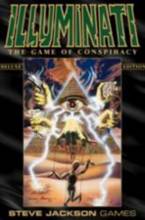 Illuminati Deluxe EditionSteve Jackson GamesBased on the infamous trilogy by Robert Shea and Robert Anton Wilson, this boxed game has players trying to take over the world by controlling cards representing humorous parodies of real-world and not-so-real-world organizations (from the C.F.L.A.I.O. to the Trekkies to the Mad Scientists). Each player can win by controlling enough organizations, or by fulfilling their special goal, which is different in each case. Players can take control of whole arms of their competitors' power structures, destroy organizations utterly, or simply render them neutral again. And, as in the real world, it all comes down to money: Can you and your allies generate enough of it to conquer the world while staving off attacks of jealousy? The money aspect gets a little silly sometimes, as one can easily get into a ridiculous bidding war in trying to take over an organization - and then fail anyway. I think this is an okay game. Expansion sets for this game include Illuminati Y2K and Illuminati Brainwash, neither of which I've played. There's also a collectible card game variant, which seems now to be out-of-print.
Kill Doctor LuckyCheapass GamesA "pre-mystery board game" from those wacky guys at Cheapass Games. Clearly modelled on Clue, in this game everyone is trying to kill the victim, who moves through a Victorian-style house according to certain rules. Players move, too, trying to find things to kill Dr. Lucky with, and trying to gain card with which to prevent other people from killing him. A murder attempt can only be made if other players can't see into the room in which you're alone with the good Doctor. As with Give Me The Brain, this game suffers from the problem that some players may get turns only rarely, although it's not nearly as extreme in that regard as Brain. It works pretty well, but not great. I think this is an okay game.
 ManhattanMayfair GamesIn six blocks of this island, players build skyscrapers by placing one-, two-, three- or four-story pieces on one of nine sites in each block. The player who owns the topmost piece of a building owns the building, and players get points after each of four rounds for each building they own, for owning the most buildings in a block, and for owning the tallest skyscraper on the board. It plays fast and is a little subtle, but is not a gosh-wow game by any means. I think this is an okay game.
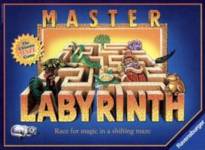 Master LabyrinthRavensburgerMaster Labyrinth is a German game played on a board representing a labyrinth; the trick is, the tiles are moveable, so every turn the board is a little different. A player's turn consists of altering the maze, and moving his piece. The goal is to pick up ingredients for magical spell recipes; the trick is you have to pick up the counters in numerical order, for instance, no one can pick up counter #6 until #s 1-5 have been picked up. So you have to plan your moves carefully, because the maze may be completely different by the time your turn comes around again. I think this is a great game. Strangely, it works best with exactly three players, although two or four can play, too.
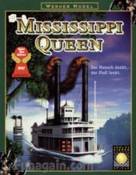 Mississippi QueenGoldsieber Spiele/Rio GrandeThis is a fairly standard race game using riverboats on the Mississippi. There are two catches: The board is built more-or-less at random as you go (meaning you have to contend with obstacles you can't quite see in time), and you have to pick up passengers along the way. The game system is simple and it plays fairly quickly, but the English-translation rules could be clearer. I think this is an okay game. There is an expansion to this game called The Black Rose, which I have not played but which I've heard makes the game much more enjoyable.
 Rail BaronAvalon Hill GamesRail Baron is a railroading game played on a map of the historical Unites States rail lines. A player rolls for a random destination, and then has to move his train there, at which point he collects money based on how far he moved. The trick is that players can then buy these historical railroads with the money they earn, and pretty soon players get shut out of certain regions, and have to pay to use someone else's railroad if they need to get to that region. So it gets pretty competitive. It's a slightly different twist from Mayfair's Empire Builder series of rail games, and it feels like an older, less sophisticated game, but it's still worth playing. Works best with at least four players; with three, you don't get enough competition for rail lines to get the full effect. I think this is a good game. It works best with at least four players, to get the true competitive feel of the game.
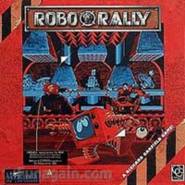 Robo RallyWizards of the CoastOn a world far, far away, bored computers have created landscapes of pits, conveyor belts, and other goodies and started running enthusiastic-but-stupid robots through them as Robo Rallies. Each player controls a robot running through the hostile metal landscape, trying to touch each of up to six flags in order without becoming furnace fodder. The first player to do so wins. What makes this tricky is that each turn consists of five moves, and all fives moves are programmed at the beginning of the turn, so your ability to react is somewhat limited, especially when an opponent pushes your robot off-course in the middle of a turn! Moreover, you can take damage from the environment or from your opponents' lasers, which reduce your ability to program your bot, and sometimes force your actions to repeat each turn (this is very, very bad!). Best with at least four players, preferably even more. Adding the expansion sets can make for even more lunacy. Armed and Dangerous is a must-have, as it adds many additional weapons. Crash and Burn, Radioactive and Grand Prix add new boards to play on.
I think this is a great game, mixing skill with utter chaos and total silliness. It's extremely well-designed, and lends itself to a number of off-the-cuff variants. Regrettably, it is no longer in print, but you should grab a copy if you ever encounter one.
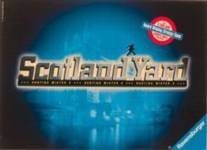 Scotland YardRavensburgerUpon a very nicely-rendered street map of London, the goal here is for the two or more players playing Investigators to track down the player playing Mister X. The trick is that Mister X is mostly invisible; he only appears on the board once every six turns or so, and after that all you know is by what method of travel (cab, bus, underground) he moved. So it's an intense reasoning game, and Mister X needs to think, too, to figure out how to evade the web the Investigators place him in. My experience is that Mister X has it a little too easy, because as the game winds down, the Investigators' means of movement become more restricted. Moreover, as the game progresses, Mister X actually acquires more movement ability, compounding the problem. I think this is an okay game. It's worth playing a few times, anyway.
 The Settlers of CatanMayfair Games/KosmosMayfair licensed this German game for US publication, and it's a great one. Each player is trying to build settlements on the imaginary island of Catan. Players place settlements at the intersection of three hexagonal tiles, and roads along the edges of those tiles. Each turn, a player rolls two dice, and players receive resources if they have settlements adjoining a tile containing the number rolled. Sound strange? It is a bit peculiar, but pretty soon players are using their resources to build settlements, trying to shut other players out of a section of the board, and trading with each other. Players get points for settlements they build, as well as certain bonus points; first player to 10 points wins. There is no combat in the game. It plays fairly quickly, too. I think this is a great game. I strongly suggest buying the German edition rather than the American edition, as the artwork is prettier (in my opinion) and easier to follow, and the pieces generally seem to be of higher quality. There are also expansion sets to Settlers, including The Seafarers of Catan (which introduces trade routes to islands off the coast of Catan) and Cities and Knights (in which you build armies to defend against invading barbarians). Seafarers is an excellent addition to the game, but Cities is not very successful, adding complexity and changing the character of the game without much added benefit.
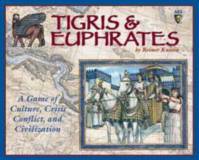 Tigris and EuphratesMayfair GamesIn this game, each of three-to-four players is the ruler of a people in the ancient Tigris and Euphrates river valley. Each people has four leaders who oversee certain spheres of influence (politics, religion, farming, fishing), and who can be placed in any existing nation on the board. Nations are formed and extended by players placing tiles on the board's grid, gaining victory points for the player who has the corresponding leader for that tile in that nation. The catch is this: There are four spheres of influence, each with its own color, and each player gains victory points in all four categories, and his total score is the lowest of his four totals. So to win you must be able to advance in all four spheres of influence. The peculiar thing about this game is that you're not controlling a geographical nation, but rather parts of potentially several such nations. Each nation can only have one of each ruler type, so you can attempt to oust someone else's ruler from a nation, or you can cause two nations to unify (through placing tiles to extend their boundaries) resulting in conflicts between leaders of similar type. Conflicts results in additional victory points - potentially many of them. So choose your battles (and the battles of others) carefully! This game has a lot of replay value, as there are many interesting strategies, and even if you're not winning, it's fun to play havoc with other peoples' strategies. I think this is a great game, perhaps the best I've seen since The Settlers of Catan, with similar replay value.
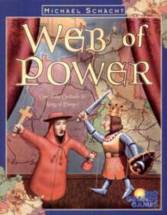 Web of PowerGoldsieber Spiele/Rio GrandeWeb of Power is a simple game played on a map of Europe, crossed by roads and marked by regions. Players take turns placing "monasteries" on roads, and "counsellors" in regional capitals. Scoring occurs periodically, with players earning points for lengths of unbroken monasteries on roads, supremacy of counsellors in adjacent regions, and number of monasteries in a single region. Where you can place pieces is controlled by cards you draw from the deck, though the use of wild cards gives you a number of options. The game plays fast, and with four or five players there are many considerations to deciding where to place individual pieces, especially if a scoring period is coming up. You get the most points through consellor supremacy, but since you must have supremacy in more than one adjacent region, that can sometimes be the hardest goal to achieve. Despite its simplicity, I think this is a good game. We found it to have surprisingly high replay value, perhaps in part because it plays so fast, so we can get multiple games in during an evening.
hits since 21 August 2000.
|
